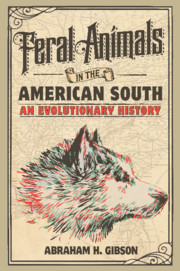Feral Animals in the American South
The relationship between humans and domestic animals has changed in dramatic ways over the ages, and those transitions have had profound consequences for all parties involved. As societies evolve, the selective pressures that shape domestic populations also change. Some animals retain close relationships with humans, but many do not. Those who establish residency in the wild, free from direct human control, are technically neither domestic nor wild: they are feral. If we really want to understand humanity's complex relationship with domestic animals, then we cannot simply ignore the ones who went feral. This is especially true in the American South, where social and cultural norms have facilitated and sustained large populations of feral animals for hundreds of years. Feral Animals in the American South retells southern history from this new perspective of feral animals.
- Provides the first history of feral animals, including economic, scientific, cultural, and ethical analysis, contributing to the growing field of 'animal history'
- Provides a major contribution to the growing field of southern environmental history, relevant to readers from both environmental history and southern history
- No other book takes as broad an approach to understanding animals, providing a history of humanity's relationship with domestic animals as well
Reviews & endorsements
'Abraham H. Gibson’s Feral Animals in the American South: An Evolutionary History tells a fascinating story of animals in the American South and, as importantly, a fascinating story of humans – free and enslaved – in the American South. One comes away wiser and in many respects sadder about our relationships with animals and at least as much about our relationships with each other. This is a very important book that is relevant to many scholars in varying fields.' Michael Ruse, editor of The Cambridge Encyclopedia of Darwin and Evolutionary Thought
'Abraham Gibson’s Feral Animals in the American South is an ambitious work unveiling the comparative feral histories of pigs, dogs, and horses. … Those interested in teaching, researching, or simply learning about such processes should read Gibson’s book. I expect it will be required reading for scholars and students engaging in the cross-section of environmental and animal studies.' Tyler Parry, Environmental History
Product details
September 2018Paperback
9781316610091
245 pages
229 × 151 × 16 mm
0.4kg
20 b/w illus.
Available
Table of Contents
- 1. The trouble with ferality: domestication as coevolution and the nature of broken symbioses
- 2. Making and breaking acquaintances: the origins of wildness, domestication, and ferality in prehistoric Eurasia
- 3. When ferality reigned: establishing an open range in the colonial South
- 4. Nascent domestication initiatives and their effects on ferality: claiming dominion in the antebellum South
- 5. Anthropogenic improvement and assaults on ferality: divergent fates in the industrializing South
- 6. Everything in its right place: wild, domestic, and feral populations in the modern South
- Epilogue: cultivating ferality in the Anthropocene.






